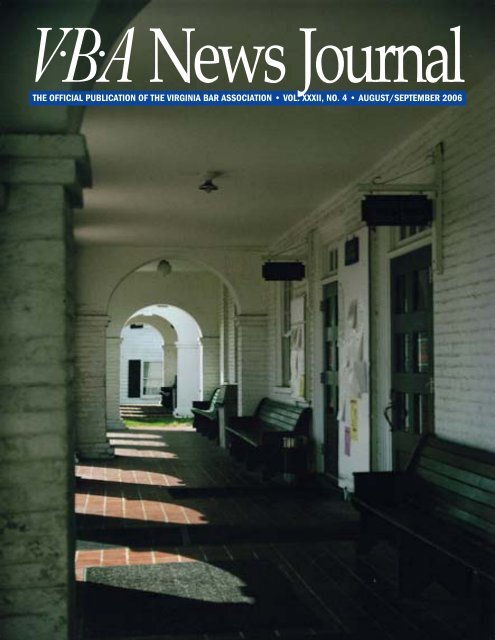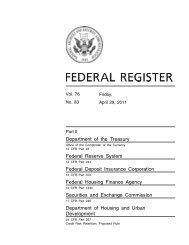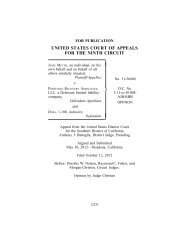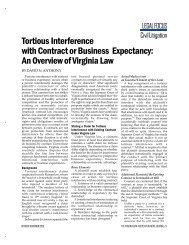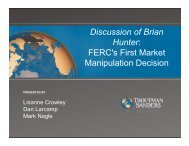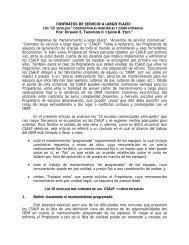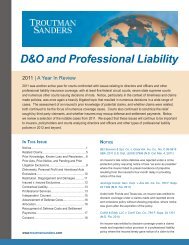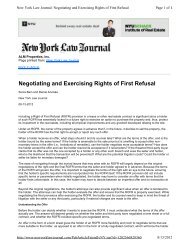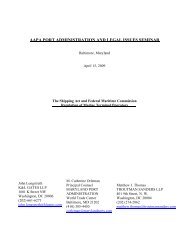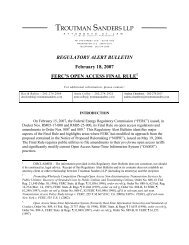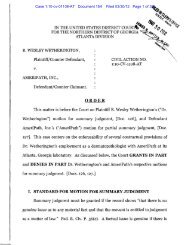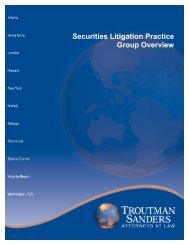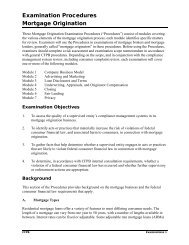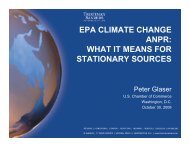Pre-Filing Injunctions - Troutman Sanders LLP
Pre-Filing Injunctions - Troutman Sanders LLP
Pre-Filing Injunctions - Troutman Sanders LLP
Create successful ePaper yourself
Turn your PDF publications into a flip-book with our unique Google optimized e-Paper software.
VBA News Journal• •THE OFFICIAL PUBLICATION OF THE VIRGINIA BAR ASSOCIATION • VOL. XXXII, NO. 4 • AUGUST/SEPTEMBER 2006
We know you have written the bestBuy/Sell agreement with your lawpartners, but how well is it funded?Need funding options through life insurance?Call Virginia Barristers Alliance, Inc.AETNAAmerican General LifeAmerican Mayflower Life Insurance Companyof New YorkAmerUs Life Insurance CompanyBankers Life Insurance Company of New YorkBanner Life Insurance CompanyCanada Life Assurance CompanyCanada Life Insurance Company of NYCompanion Life of NYContinental Assurance CompanyEmpire General Life Assurance CompanyFirst Colony Life Insurance CompanyFirst Penn PacificGeneral Electric Capital Assurance CompanyGE Life & Annuity Assurance CompanyGerber Life Insurance CompanyGuarantee Trust LifeHartford Life Insurance Company Co.Jefferson Pilot Life Insurance CompanyJohn Hancock Financial ServicesLincoln BenefitLincoln LifeLincoln Life of New YorkManufacturers Life Insurance CompanyManufacturers Life of New YorkMassMutualMetropolitan LifeNew York Life Insurance CompanyNew York Life Insurance & Annuity Co.North American Company for Life & HealthNorth American Company of NYOld Line LifePrincipal LifePrudentialReliaStar Life Insurance CompanyReliaStar Life of New YorkSecurity-Connecticut Life Insurance CompanySecurity Mutual Life Insurance Companyof New YorkSouthland LifeState LifeSun Life Assurance of CanadaUnited States Life in City of NYUnited of Omaha Life InsuranceValley Forge Life Insurance CompanyWilliam Penn LifeZurich LifeWe hope having these options available will help.Let one of our professionals help you and your clients.Virginia Barristers Alliance, Inc.The Insurance Agency Subsidiary of The Virginia Bar AssociationDean Hardy and Howard DiSavino Jr.4880 Sadler Road, Suite 110, Glen Allen, Virginia 23060(804) 290-8720 direct line • 1-800-358-7987 toll-free • (804) 762-4192 faxe-mail: hdisavino@finsvcs.com
PRESIDENT’S PAGEImproving the Law in the Public InterestBY WILLIAM R. VAN BUREN IIIOne of the unique strengths ofThe Virginia Bar Association is itssingular ability to represent abroad spectrum of the lawyers ofVirginia in lobbying importantissues of law reform beforeVirginia’s General Assembly. As avoluntary organization, free of theconstitutional restraints on theapplication of mandatory duespayments, and as a statewideorganization attracting Virginialawyers of diverse specialties andbackgrounds, we have always feltan obligation to use ourconsiderable resources to standfront and center as advocates ofissues that are important to theadministration of justice and theimprovement of Virginia’slegislative scheme.There is no better example of theseriousness with which we takethis responsibility than our fightto eliminate the inadequacies ofVirginia’s system of funding thedefense of indigent citizensaccused of criminal conduct. TheVBA and the great majority of itsmembers have no economicinterest in this issue. We welcometo our membership all Virginialawyers, whose practice areasrange the full breadth of civil andcriminal practice, whether focusedon plaintiff or defense work andwhether large- or small-firmbased. Our objectivity on thisissue is well recognized andrespected by the legislature andthe public. Given the lack of anynatural constituency of voters thatmight otherwise rise up in supportof correcting this problem, theissue is squarely within the zone ofthe VBA’s primary mission.Working to improve the law andthe administration of justice hasbeen a key element of our missionstatement since the founding ofthis organization.Virginia is last among all 50states in its funding for courtappointedcounsel and hasconsistently underfunded publicdefender offices where salarylevels, inadequate resources andheavy caseloads have left open theclear possibility that even the bestintentioned of the lawyers servingthese defendants can be challengedto provide an adequate defense tothe accused indigents placed intheir charge. Our system dependson a fair process to ensure that thereal perpetrators of crime arebrought to justice, and we aredetermined that Virginia stepforward to appropriately fund thisconstitutional obligation.Virginia’s traditions of fairnessand its legacy of leadership indemocratic principles are sufferingfrom its failure to do so.Together with our colleagues inthe Virginia Indigent DefenseCoalition, we are applying the fullmeasure of our political resourcesto address this issue. We haveemployed our lobbyists and metwith the Governor, the ChiefJustice and the Attorney Generalto advocate an effective andimmediate solution. In response tothis initiative, the Governor hasappointed a Criminal JusticeReform Committee on which Ihave agreed to serve and we areoptimistic that we will have theThe political leverage of your dues payments isenormous and may well be reason enough tosupport the VBA with your membership.Unquestionably, there is strength in numbers andthe more you convince your colleagues to join theircollective voice with ours, both as dues-payingmembers and as public advocates, the moreeffective we will be in our law reform efforts.opportunity to build on the firstsmall steps forward taken in thisyear’s legislative session.Although the indigent defenseeffort has been a key area of focusfor your Board, it is but one of amultitude of issues we addresseach year in our efforts to improvethe law in ways that serve thepublic interest. Our substantivelaw sections do extraordinary,often unheralded, work in offeringthe benefit of their collectiveexpertise to the Virginia GeneralAssembly. For example, ourBusiness Law Section isunquestionably the driving forcebehind continuing improvementsin our business law statutes,including the Virginia StockCorporation Act, the VirginiaLimited Liability Company Actand the Virginia Business TrustAct. The VBA Health Law Sectionhas taken a leadership role inconforming Virginia’s medicalrecord statutes with federalHIPAA legislation and is a trustedresource for the General Assemblyin the complex field of health law.The Boyd-Graves Conference,coordinated and supported by theVBA, and our Civil LitigationSection continually advanceimportant initiatives that improvethe court and trial procedures inthe Commonwealth. In addition tothe many hours devoted by your4/THE VIRGINIA BAR ASSOCIATION NEWS JOURNAL AUGUST/SEPTEMBER 2006
volunteer leadership, sectioncouncils and legislativecommittees, the VBA’s executivedirector, Guy Tower, is aregistered lobbyist and activelypromotes our legislative agenda.And we invest significant financialresources annually in the work ofour effective “outside” lobbyists,Tony Troy and Anne Leigh Kerr of<strong>Troutman</strong> <strong>Sanders</strong> and Rob Jonesof Alliance Group, to advance thisimportant work on behalf of thelawyers of Virginia. Many of theseefforts greatly improve the climatefor business in the Commonwealthand the due process affordedVirginia citizens.The political leverage of your duespayments is enormous and maywell be reason enough to supportthe VBA with your membership.Unquestionably, there is strength innumbers and the more youconvince your colleagues to jointheir collective voice with ours, bothas dues paying members and aspublic advocates, the more effectivewe will be in our law reform efforts.The next time the legislaturesuggests that a sales tax should beimposed on legal services, you willbe glad to know that a viable andstrong VBA will be there to opposeit.Before I conclude this messageabout the importance andeffectiveness of our law reformefforts, I want to share with youan e-mail exchange with one of ournewest Board members who askeda question that I suspect concernsmany of our members from time totime. We get a great deal ofthoughtful input and criticalthinking from our Board members,particularly those whose firstexperiences in the inner workingsof our Board cause us toappropriately reflect on ourresponsibilities.Dave Sump, the outstandingnew chair of the Law PracticeManagement Division, wrote to meduring the last legislative sessionand I offer, with his permission, anexcerpt of his potential concernsregarding the VBA’s work in lawreform.As a new board member, I have aquestion that may not warrant anagenda item but may be worth somediscussion via e-mail. I am not sure Iunderstand how the VBA Board ofGovernors determines its positionson various legislative items beforethe General Assembly. I am amember of another “broad-based” barassociation, the Maritime LawAssociation. The membership of theMLA includes attorneys from everyside of almost every issue. Usuallythe MLA has great difficulty insupporting or opposing legislationbecause in doing so, they are actingagainst the interests of some of themembership.As such, the MLA narrowlyaddresses legislation. The MLA willopine if the proposed legislationdeviates from “internationalnorms”— thereby disturbinguniformity in the law. The MLA willalso opine when the proposedlegislation will do widespread harmto the maritime law by invoking the“rule of unintended consequences.”As a member of the MLA LegislativeCommittee, it is rare that theorganization speaks on substantivematters, and the association typicallyjust keeps the members informed sothey may act accordingly.As for the VBA, the currentlegislative effort to enhance indigentdefense is an excellent example of aprogram with widespread support.However, the general rubric “lawreform” is puzzling to me. How doesthe VBA avoid alienating a segmentof the membership, or potentialmembership, in the positions it takesin the name of “law reform?” Thisis especially true of legislativeactions taken by substantivecommittees. Are we sure thelegislative actions taken by thesubstantive committees are supportedby and benefit the membership as awhole or even the practitioners ofthat substantive area of the law?Having given this issue muchthought during my years ofinvolvement with the VBA, Ioffered Dave the followingresponse, one which I thinkexplains, in the most succinct waypossible, the process by which weact on these matters for the benefitof our members and the public andone which I hope will give yougreat trust in the importance weplace in the fulfillment of ourresponsibility as your leadership.David, your point is well taken andis a notion that we are continuallyfocused on. The Board must approveall legislative initiatives. Our focusis on law reform that improves theadministration of justice, eliminatesambiguity in the statutory schemeand enhances the overallprogressiveness of our code systemto improve its compatibility withfederal and other state schemes. Wetry to avoid issues that represent theinterests of a narrow businessconstituency or that are likely to bepolitically sensitive, either becausethey involve moral judgments, orspecific economic interests. We dorun the risk from time to time thatnot all of our members will agreewith the positions we take. TheBoard’s job is to be sure we areengaging in law reform for the rightreasons as the conscience of theprofession and a resource to theVirginia legislature. We serve as acheck on the work of the substantivelaw sections to be sure that thecontrary views are understood andrespected and to be sure that themotivation for the change isconsistent with our overall charge.Hopefully, we get that right most ofthe time but we look to our Boardmembers to help us remain cognizantof other perspectives.The relevance of the VBA is clearto those who do its mostimportant work. Our continuedchallenge is to appropriatelycommunicate and continuallyreinforce that relevance to ourmembership and the lawyers ofVirginia. The judicial selectionprocess, the recommendations ofthe Futures Commission on theVirginia Judiciary, the indigentdefense initiatives and the need toassure appropriate levels offunding for judges and other courtpersonnel are all issues of currentfocus in which we are fullyengaged. I hardly know whatissues the future will bring. As alawyer in Virginia, I do know thatI will always need the VBA toaddress them. VBAAUGUST/SEPTEMBER 2006 THE VIRGINIA BAR ASSOCIATION NEWS JOURNAL/5
116th SUMMER MEETINGA Review in PhotosHighlighted by a debate between Virginia’s Republicanand Democratic U.S. Senate candidates and a visit fromthe Governor and First Lady, buttressed by an array ofCLE programs and enlivened by fine art and festiveentertainment, the VBA’s 116th Summer Meeting, heldJuly 20-23 at The Homestead, was a weekend toremember for all who attended!RIGHT:Governor TimKaine, guest ofhonor for theSaturdayreceptionsponsored byLexisNexis,offered specialpraise to FirstLady AnneHolton for herlegal work onbehalf of theindigent.The sounds of KOS (formerly the Kings of Swing) luredthe VBA crowd to the dance floor during an evening thatwas “short on speeches, long on entertainment.”RIGHT: JohnBredehoft andLynn Jacob led alively CLEprogrampresented by theLabor Relationsand EmploymentLaw Section.LEFT: VBA<strong>Pre</strong>sident BillVan Buren(right) helpedJustice StevenAgee unveil hisportrait,presented to himby the VBAduring theFriday eveningbanquet.Speakers for programs during theweekend included Anne MarieWhittemore (above), chair of theFutures Commission; Prof. JohnNorton Moore of UVA (left); and Dr.James Kelly of the Virginia HistoricalSociety (far left).6/THE VIRGINIA BAR ASSOCIATION NEWS JOURNAL AUGUST/SEPTEMBER 2006
○○○○○○○○○○○○○○○○○○○○○○○○○○○○○○○○○○○○○○○○○○○U.S. Senate candidates, incumbent Republican George Allen and Democratic challenger Jim Webb, faced off in aSaturday morning debate moderated by Dr. Robert Holsworth of VCU (far left), with assistance from panelists DavidLerman, Jay Warren and Tyler Whitley, and timekeeper Henry Willett. The “Senatorial Showdown” attracted internationalmedia attention (right) and several hundred VBA members, guests and interested citizens.FAR LEFT: VBA<strong>Pre</strong>sident-elect GlennLewis accepted theDeMallie Award foroutstanding contributionsto continuing legaleducation in Virginia.LEFT: VBA Life MembersJohn M. Ryan, Joseph C.Knakal Jr., and Hon. F.Ward Harkrader Jr.,joined VBA <strong>Pre</strong>sident BillVan Buren to celebratetheir 40 years of VBAmembership.Gallery owner Ginger Levit (left) offered tips on evaluating and collecting art, while art dealer Martha Craddock (right,with Steve Busch and Dr. George Craddock) displayed Virginia landscapes for sale in the registration area.Members packed CLE programs, balancing educational VBA Board member John Epps (standing, center)pursuits with recreational activities and social events. celebrated a lucky strike during the VBA/YLD bowlingsocial.AUGUST/SEPTEMBER 2006 THE VIRGINIA BAR ASSOCIATION NEWS JOURNAL/7
LEGAL FOCUSCivil Litigation<strong>Pre</strong>-<strong>Filing</strong> <strong>Injunctions</strong>:A Practical Solution to the Problemof Harassing Pro Se LitigantsBY BRYAN M. HAYNES AND BRANDON ALMONDHarassing pro se litigants are afamiliar problem for many largecompanies. Under this regrettablycommon scenario, a pro se plaintiffrepeatedly files the same frivolousclaims against the same company.Although the claims are ultimatelydismissed, the company incurssubstantial legal fees each time anew suit is filed. Monetarysanctions often are not an optionbecause the pro se plaintiff cannotafford to pay any court-imposedpenalty. Fortunately, there is asolution to this problem — courtimposedpre-filing injunctions.Sources of Court Authorityfor Imposing a <strong>Pre</strong>-<strong>Filing</strong> InjunctionIt is no secret that a litigiousplaintiff pressing a frivolous claim,although rarely succeeding on themerits, can be extremely costly tothe defendant and can waste aninordinate amount of court time. 1Although this often appears to bean incurable problem when theplaintiff is pro se, federal courtshave both the inherent power andthe constitutional obligation toprotect their jurisdiction fromconduct that impairs their abilityto carry out their Article IIIfunctions. 2 An effective way forcourts to enforce this power is toimpose pre-filing injunctions thatprevent a plaintiff from filingfuture frivolous suits.In federal court, 3 there are twosources of authority for courts toimpose a pre-filing injunction. 4The first is a defendant’s motionfor sanctions – or imposition ofsanctions on the court’s owninitiative – under Federal Rule ofCivil Procedure 11(c). Under thefamiliar Rule 11 standard, suchsanctions are warranted if the suitis not “well grounded in fact, wellgrounded in law,” or is“interposed for an improperpurpose.” 5 For example, in Mazur v.Woodson, the court awarded thedefendant’s attorneys’ fees andimposed a pre-filing injunctionagainst the plaintiffs based on afinding that the plaintiffs violatedRule 11. 6Federal courts also have theauthority to impose pre-filinginjunctions under the All WritsAct, 7 which provides that “allcourts established by Act ofCongress may issue all writsnecessary or appropriate in aid oftheir respective jurisdictions andagreeable to the usages andprinciples of law.” This statutegives federal courts the authorityto issue injunctions limiting accessto the courts by vexatious andrepetitive litigants. 8 However,courts have held that suchinjunctive relief is an extremeremedy that should not beroutinely granted, and that suchrelief is inappropriate unless thereis a real and immediate threat offuture injury combined withobjectionable past conduct. 9 Ingranting pre-filing injunctionsunder the All Writs Act, courtsgenerally are concerned withpreventing re-litigation of issuesthat have already been decided. Itis essentially “an extra arrow inthe quiver of res judicata andcollateral estoppel.” 10Irrespective whether a courtimposes a pre-filing injunctionunder Rule 11 or the All Writs Act,the plaintiff must first be givennotice and an opportunity toobject. 11 Note, however, that whena defendant makes a motion forsanctions under Rule 11, and theplaintiff responds to such amotion, this constitutes adequatenotice and opportunity to be heardsuch that pre-filing injunctionsmay thereafter be imposed. 12Likewise, when a court orders aplaintiff to show cause whysanctions should not be imposedfor filing a frivolous suit, theplaintiff is considered to havereceived adequate notice and anopportunity to respond. 13Standards for Obtaininga <strong>Pre</strong>-<strong>Filing</strong> InjunctionIn determining whether to issuea pre-filing injunction, courts inthe Fourth Circuit consider thefollowing circumstances: (1) theparty’s history of litigation, inparticular whether they have filedvexatious, harassing, orduplicative lawsuits; (2) whetherthe party has a good faith basis forpursuing the litigation, or simplyintends to harass; (3) the extent ofthe burden on the court and otherparties resulting from the party’sfilings; and (4) the adequacy ofalternative sanctions. 14 The fourthfactor can be particularlyimportant when a pro se plaintiff isinvolved; therefore, a court must8/THE VIRGINIA BAR ASSOCIATION NEWS JOURNAL AUGUST/SEPTEMBER 2006
consider the pro se status of thelitigant when determiningwhether a pre-filing injunction isappropriate. 15In Payman, the plaintiff, who hadan extensive history of filing pro selawsuits without evidentiarysupport, nonsuited a motion forjudgment in state court thatalleged the same facts, against thesame defendants, as twocomplaints which recently hadbeen dismissed in federal court. 16On the defendants’ subsequentmotion in federal court for a prefilinginjunction, the court foundthat “because [the plaintiff] has apattern of filing frivolous lawsuits;does not have a good faith basis forcontinuing to prosecute this legalaction; has burdened the legalsystem with other lawsuitsconcerning the same issues raisedin this case; and alternativesanctions have not worked in thepast,” the plaintiff met therequirements for a pre-filinginjunction. 17 Citing it as “clearlynecessary based on [the plaintiff’s]litigation history,” the courtenjoined the plaintiff from filingany actions against the defendantsin any court (state or federal)without first obtaining leave of thecourt. 18Possible Parametersof a <strong>Pre</strong>-<strong>Filing</strong> InjunctionAlthough pre-filing injunctionsgenerally prohibit a vexatiouslitigant from filing future lawsuits,the parameters of the injunctionvary depending on thecircumstances. Courts havecrafted pre-filing injunctionscontaining a wide range ofprohibitions, including: (1)requiring the plaintiff to submit an“Application for Leave to File Suitin Federal Court,” a copy of theorder imposing the pre-filinginjunction, and a notarizedaffidavit certifying that thematters raised in the suit havenever been raised or disposed of onthe merits in either state or federalcourt; 19 (2) prohibiting the plaintifffrom filing any civil action in anyfederal court without leave ofcourt, requiring the plaintiff tocertify in her application for leaveto file that the claim(s) she wishesABOUT THE AUTHORSBryan Haynes is a senior litigation associate in the Richmond office of <strong>Troutman</strong><strong>Sanders</strong>. He received his J.D. degree from the George Mason University School ofLaw, and his undergraduate degree from Virginia Polytechnic Institute & StateUniversity. After law school, he served as a law clerk for The Honorable DianeGilbert Sypolt, U.S. Court of Federal Claims, Washington, D.C. Brandon Almond isa third-year law student at Washington and Lee University School of Law. Heworked as a summer associate at <strong>Troutman</strong> <strong>Sanders</strong> in 2006.to raise have never been “raised ordisposed of on the merits by anystate or federal court,” and“absolutely” prohibiting theplaintiff from filing any action thatis related to the facts or parties inthe current case; 20 (3) limiting thenumber of cases the plaintiff mayhave pending on the activedocket; 21 and (4) enjoining theplaintiff from filing further suitsuntil monetary sanctions are paidand unless the judge rules that thenew claims are not frivolous. 22There are some limitations,however, on the possibleparameters of a pre-filinginjunction. Rule 65(d) of theFederal Rules of Civil Procedurerequires that, if an injunction isgranted, the order granting theinjunction “shall set forth thereasons for its issuance[,] . . . bespecific in its terms[,] . . . [and]describe in reasonable detail . . .the act or acts sought to berestrained.” 23 Furthermore, prefilinginjunctions should be“tailored to the specificcircumstances presented,” suchthat no litigant shall be deniedtheir day in court. 24 For example,in Cromer, the Fourth Circuit foundtoo broad an injunction thatprevented the pro se plaintiff frommaking any future filings in anycase (even unrelated cases) infederal court without firstobtaining permission from themagistrate judge who issued theinjunction. 25 Likewise, in craftingthe injunction issued in Payman,the court first stated that it would“not enjoin [the plaintiff] fromfiling any actions anywhereagainst the defendants or partiesin privity with the defendants, asthat would deny [the plaintiff]access to the courts for potentiallymeritorious claims in the future.” 26The Anti-Injunction ActLimits a Federal Court’s Authorityto Enjoin Litigantsfrom Proceeding in State CourtsAlthough Rule 11 and the AllWrits Act give federal courtsconsiderable latitude to issueinjunctions against vexatiouslitigants, federal courts are limitedin their authority to enjoinplaintiffs from filing future suits instate court. A federal court may notenjoin a litigant from filing in statecourt unless the injunction fallswithin one of the exceptions listedin the Anti-Injunction Act, 27 whichprovides that: “[a] court of theUnited States may not grant aninjunction to stay proceedings in aState court except as expresslyauthorized by Act of Congress, orwhere necessary in aid of itsjurisdiction, or to protect oreffectuate its judgments.” 28Only the Anti-Injunction Act’sthird exception, which allows afederal court to enjoin state courtproceedings to protect itsjudgments, provides an avenuethrough which a federal court canenjoin a vexatious litigant fromproceeding in state court. Thisexception, which has come to beknown as the “relitigationexception,” permits a federal courtto prevent state court litigation ofan issue that previously waspresented to and decided by thefederal court. 29 This exception isfounded in the well-recognizedconcepts of res judicata andcollateral estoppel. 30 A federalcourt may issue an injunctionunder the relitigation exception ifit has actually decided the claimsor issues subject to theinjunction, 31 and a party whoseeks to invoke the exception mustmake a “strong and unequivocalshowing” of relitigation of thesame issue. 32 Finally, any doubtsAUGUST/SEPTEMBER 2006 THE VIRGINIA BAR ASSOCIATION NEWS JOURNAL/9
as to the propriety of a federalinjunction against a stateproceeding are resolved againstentering the injunction. 33ConclusionParties faced with vexatiouslitigants, for whom monetarysanctions are not a deterrent, havean effective solution in pre-filinginjunctions. Both Rule 11 and theAll Writs Act give federal courtsthe power to sanction suchplaintiffs through the issuance ofpre-filing injunctions. Parties mayobtain such a remedy providedthat the injunction is narrowlytailored and the plaintiff is givenadequate notice and anMany thanks to ourSummer Meeting Sponsors!BB&TCSX CorporationDominion ResourcesEquity Concepts, QA3Hogan & Hartson <strong>LLP</strong>Hunton & Williams <strong>LLP</strong>Kaufman & Canoles PCLeClair Ryan PCLexisNexisMinnesota Lawyers MutualInsurance CompanyNorfolk Southern CorporationPhillip S. Griffin II, PCThe HomesteadThe Lewis Law FirmU.S. Bank Corporate TrustServicesWhitham, Curtis,Christofferson & CookWilliams Mullenopportunity to object to theinjunction. Finally, a federal courtmay extend a pre-filing injunction,not only to federal courtproceedings, but also to state courtproceedings, provided that theclaim or issue has been previouslylitigated in federal court.NOTES1. See Sassower v. Whiteford, Taylor &<strong>Pre</strong>ston, Nos. 90-1142, 90-1146, 90-8122,1991 U.S. App. LEXIS 13933, *3 (4th Cir. July2, 1991), reported at 940 F.2d 653.2. See Armstrong v. Koury Corp., Nos. 99-2511, 99-2512, 2000 U.S. App. LEXIS 6459,*2 (4th Cir. Apr. 10, 2000); Johnson v. PepBoys, No. 2:04cv632, 2005 U.S. Dist. LEXIS41500, *23 (E.D. Va. June 14, 2005) (“Adistrict court has the fundamental power toprotect itself against abuse.”).3. Although most pre-filing injunctions areissued in federal court, Virginia circuit courtsalso have issued pre-filing injunctions onoccasion. See, e.g., Morrissey v. RockinghamMem’l Hosp., 62 Va. Cir. 462, 464 (Va. Cir. Ct.2003) (holding that, should the plaintiff wishto file future suits involving the same issuesor parties as the case at bar, he must firstsubmit an “Application for Leave to File Suitin a State Court,” and attach a notarizeddeclaration or affidavit certifying that thematters raised in the new suit have neverbefore been raised in state or federal courtand that he has satisfied all previousmonetary judgments); Anderson v. Sharma,33 Va. Cir. 543, 544-47 (Va. Cir. Ct. 1992)(barring the plaintiff from filing further suitsin the same circuit without prior leave of thecourt, and stating that “the Court has aninherent power to protect its jurisdiction fromrepetitious, frivolous and harassing conductwhich abuses the judicial process”). Both ofthese decisions relied on the court’s authorityto issue sanctions under Va. Code § 8.01-272.1, which mirrors Fed. R. Civ. P. 11.4. See Ezell v. Dan River, Inc., No. 4:02cv17,2002 WL 32512847, *5 (W.D. Va. Nov. 1,2002).5. McMahon v. F&M Bank-Winchester, No.93-2392, 1994 U.S. App. LEXIS 36788, *6(4th Cir. Dec. 30, 1994).6. See Mazur v. Woodson, 191 F. Supp. 2d676, 684 (E.D. Va. 2002) (citing a clear patternof the plaintiffs abusing the state and federalcourt systems, and in the process harassingthe defendant and costing him unnecessarylitigation expenses).The VBA Law Practice Management Division has established an agreement with theAmerican Bar Association to sell ABA books to all members of the VBA/LPMD — that is, allmembers of The Virginia Bar Association — at a 20 percent discount. You can go towww.vba.org, click on a link to the Book Program, peruse a list of books, and print out anorder form to send to the VBA office with your payment. NOTE: ALL books published by theABA — not just the ones listed on the VBA website — are available with the 20 percentdiscount. You must, however, place your order through the VBA office to receive the discount.books@vba.org7. 28 U.S.C. § 1651(a) (2000).8. See Cromer v. Kraft Foods N.A., Inc., 390F.3d 812, 817 (4th Cir. 2004).9. See Payman v. Mirza, Nos. 2:02cv23,2:02cv35, 2005 U.S. Dist. LEXIS 14262, *8(W.D. Va. July 18, 2005).10. Ezell, 2002 WL at *5.11. See, e.g., Tucker v. Drew, Nos. 94-6241,94-6242, 94-6243, 1994 U.S. App. LEXIS11784, *2-3 (4th Cir. May 23, 1994) (vacatingthe district court’s order imposing aninjunction and noting that “a litigant must begiven notice and an opportunity to objectprior to imposition of a pre-filing review order,and must be notified of the consequences offailure to object to [such an order]”); WestVirginia Dep’t of Highways v. Hart, 915 F.2d1566, 1566 (4th Cir. 1990) (finding that adistrict court must not issue an injunctiveorder sua sponte without first giving thelitigant notice and an opportunity to be heard);In re Head, No. 06-6066, 2006 U.S. App.LEXIS 8265, *1 (4th Cir. Apr. 5, 2006) (same);and Cromer, 390 F.3d at 819 (noting thatbefore a judge issues a pre-filing injunctionunder the All Writs Act, even a narrowlytailored one, it must afford a litigant noticeand opportunity to be heard).12. See Mazur, 191 F. Supp. 2d at 683.13. See Autry v. Woods, 106 F.3d 61, 63 (4thCir. 1997).14. See Cromer, 390 F.3d at 818 (noting thatthe district judge did not consider each ofthe factors as required, and thereaftervacating the lower court’s injunction).15. See Ezell, 2002 WL at *5.16. Payman, 2005 U.S. Dist. LEXIS at *4.17. Id. at *12.18. Id. at *14.19. See Mazur, 191 F. Supp. at 685.20. See McMahon, 1994 U.S. App. LEXIS at*4-5. Note, however, that the court did notspecify whether “any action that is related tothe fact or parties” in the current caseincludes state as well as federal actions.21. See Butler v. United States Dep’t ofJustice, 119 F. App’x 566, 567 (4th Cir. 2005).22. See Autry, 106 F.3d at 64.23. See FED. R. CIV. P. 65(d) (2006).24. Armstrong, 2000 U.S. App. LEXIS at *2;see also Tinsley v. More Bus. Forms, Inc.,No. 93-2086, 1994 U.S. App. LEXIS 14208,*5 (4th Cir. June 9, 1994) (“An absolute barto filing actions would be patentlyunconstitutional.”); Pep Boys, 2005 U.S. Dist.LEXIS at *23-24 (“[S]o long as the injunctiondoes not completely close access to the court.. . . it should be tailored to the specificcircumstances presented.”).25. Cromer, 390 F.3d at 819 (stating thatalthough the plaintiff had proved to be a“frequent filer” with respect to hisemployment discrimination suit, “nothing inthe record justified infringing upon his rightto bring suit in unrelated cases”) (emphasisin original).26. Payman, 2005 U.S. Dist. LEXIS at *13.27. 28 U.S.C. § 2283 (2000).28. Id. at *8-9.29. See Miller v. Brooks, 315 F.3d 417, 440(4th Cir. 2003).30. Id.31. Id.32. See Nationwide Mut. Ins. Co. v. Burke,897 F.2d 734, 737 (4th Cir. 1990).33. See Bluefield Cmty. Hosp. v. Anziulewicz,737 F.2d 405, 408 (4th Cir. 1984).10/THE VIRGINIA BAR ASSOCIATION NEWS JOURNAL AUGUST/SEPTEMBER 2006
AUGUST/SEPTEMBER 2006 THE VIRGINIA BAR ASSOCIATION NEWS JOURNAL/11
COMMUNITY SERVICE PROGRAMThe Honor Roll of CSP ParticipantsA salute to the members of the legal profession in Virginia, listed alphabetically by location,who certified pro bono publico legal service and nonlegal community service for 2005VBA Pro Bono/Community Servants(100 hours or more of certified pro bonopublico legal service and nonlegalcommunity service)Patricia E. Smith, AbingdonBarbara S. Anderson, AlexandriaHon. Gerald L. Baliles, CharlottesvilleD. Brock Green, CharlottesvilleFrancis M. Lawrence, CharlottesvilleEdward B. Lowry, CharlottesvilleTracy L. Taliaferro, Colonial HeightsHon. John J. Davies III, CulpeperDaniel E. Ortiz, FairfaxRobert J. Stoney, FairfaxRichard K. Kelsey, Falls ChurchDavid B. Rubinstein, FredericksburgThomas J. Wallen, FredericksburgKarl L. Santone, GordonsvilleStephen C. Price, LeesburgGeorge W. Shanks, LurayAndrea L. Bridgeman, McLeanRobert B. Duncan, McLeanLane R. Gabeler-Millner, McLeanRichard T. Horan Jr., McLeanPhillip O. Metcalf, McLeanThomas E. Repke, McLeanScott F. Yarnell, McLeanJennifer J. Sherwood, Newport NewsElizabeth J. Atkinson, NorfolkF. Nash Bilisoly, NorfolkElaina L. Blanks, NorfolkGary A. Bryant, NorfolkMark M. Caldwell III, RadfordKaren Turner McWilliams, RestonJohn D. Adams, RichmondBrian C. Bernhardt, RichmondGina M. Burgin, RichmondAngela J. Caldwell, RichmondJames K. Cluverius, RichmondDebra J.C. Dowd, RichmondElena E. Ellison, RichmondPatricia K. Epps, RichmondKelly L.L. Faglioni, RichmondMichael P. Falzone, RichmondHarry M. Johnson III, RichmondElaine R. Jordan, RichmondTyler G. Kidd, RichmondDonald E. King, RichmondThurston R. Moore, RichmondLonnie D. Nunley III, RichmondJohn M. Oakey Jr., RichmondW. Benjamin Pace, RichmondLewis F. Powell III, RichmondW. Taylor Reveley IV, RichmondBrooks M. Smith, RichmondGary E. Thompson, RichmondJames L. Weinberg, RichmondAnn M. Green, RoanokeG. Michael Pace Jr., RoanokeJames W. Thweatt III, RoanokeAmy Sanborn Owen, ViennaJessica E. Adler, Washington, D.C.Carlyle C. Ring Jr., Washington, D.C.VBA Pro Bono Servants(50 hours or more of certified pro bonopublico legal service)H. Bradley Evans Jr., AlexandriaStephen C. Swift, AlexandriaJulia E. Sexton, CharlottesvilleStephen T. Fowler, Falls ChurchJohn G. Kelly, Falls ChurchJ. Phillip London Jr., Falls ChurchJoseph W. Gorrell, FredericksburgLinda C. McCreary, FredericksburgTracy L. Quackenbush, HalifaxDavid B. Bice, LynchburgMonica S. Burke, McLeanN. Thomas Connally III, McLeanCarolyn A. Dubay, McLeanMichael D. Erickson, McLeanEmily J. Glendinning, McLeanMelissa N. Henke, McLeanMichael E. Kinney, McLeanJon M. Talotta, McLeanVirginia T. Vance, McLeanThomas C. Brown Jr., McLeanKimberly P. Fauss, MidlothianEleanor Weston Brown,Newport NewsKevin J. Cosgrove, NorfolkBrent L. VanNorman, NorfolkKenneth J. Alcott, RichmondAlexandra D. Bowen, RichmondMonica S. Call, RichmondCassandra C. Collins, RichmondStacy M. Colvin, RichmondRita Davis, RichmondMaya M. Eckstein, RichmondDouglas M. Garrou, RichmondJeffrey H. Geiger, RichmondJason W. Harbour, RichmondGeorge H. Hettrick, RichmondLori Elliott Jarvis, RichmondChristy E. Kiely, RichmondM. Christine Klein, RichmondChristopher G. Kulp, RichmondKimberly M. Magee, RichmondRenata M. Manzo, RichmondCharlotte P. McAfee, RichmondEric J. Nedell, RichmondSamantha S. Otero, RichmondGordon F. Rainey Jr., RichmondPenny A. Shamblin, RichmondGeorge P. Sibley III, RichmondJ.R. Smith Jr., RichmondProf. Mary Kelly Tate, RichmondW. Lake Taylor Jr., RichmondKevin C. Walsh, RichmondWilliam A. Walsh Jr., RichmondRobert S. Westermann, RichmondEdward T. White, RichmondAmy M. Williams, RichmondJack R. Wilson III, RichmondMichael G. Wilson, RichmondArthur P. Strickland, RoanokeMaria R. Jones, SuffolkKatherine Leong, Washington, D.C.Elizabeth P. Williams, Washington, D.C.David B. Graham, WilliamsburgVBA Community Servants(50 or more hours of certified nonlegalcommunity service)Daniel Bieger, AbingdonH. Ashby Dickerson, AbingdonCharlie R. Jessee, AbingdonHon. Sage B. Johnson, AbingdonWade W. Massie, AbingdonHoward C. McElroy, AbingdonAnne L. Musgrove, AbingdonHon. Pamela Meade Sargent, AbingdonAlan S. Anderson, AlexandriaE. Andrew Burcher, AlexandriaHon. Robert L. Calhoun, AlexandriaBenton S. Duffett III, AlexandriaJeanne F. Franklin, AlexandriaRobert M. Gants, AlexandriaCarolyn M. Grimes, AlexandriaGordon P. Peyton Jr., AlexandriaGant Redmon, AlexandriaDaniel F. Rinzel, AlexandriaElizabeth M. Ross, AlexandriaPeter T. Straub, AlexandriaNancy Quinlan-Jaffa, ArlingtonJames K. Cowan Jr., BlacksburgPhillip C. Stone, BridgewaterMark E. Frye, BristolR. Lucas Hobbs, BristolAnnie L. Jacobs, CharlottesvilleDaniel J. Meador Jr., CharlottesvilleLeigh B. Middleditch Jr., CharlottesvilleJames F. Neale, CharlottesvilleLacey R. Parker, CharlottesvilleH. Victor Millner Jr., ChathamRobert D. Jones, ChesapeakeE. Andrew Keeney, ChesapeakeMary Ann Hinshelwood, ChristiansburgEdward C. Minor, CourtlandChristopher J. Honenberger, CulpeperDarren W. Bentley, DanvilleW. Huntington Byrnes, DanvilleDebra L. Creasy, DanvilleMichael C. Guanzon, DanvilleHon. Joseph W. Milam Jr., DanvilleGlenn W. Pulley, DanvilleR. Lee Yancey, DanvilleHon. W. Allan Sharrett, EmporiaHon. Rosemarie P. Annunziata, FairfaxBruce L. Christman, Falls ChurchAnthony E. Cooch Jr., FairfaxQ. Russell Hatchl, FairfaxJ. Robert McAllister III, FairfaxHon. R. Terrence Ney, FairfaxDavid H. Spratt, FairfaxJohn E. Coffey, Falls ChurchKeith T. Shiner, Falls ChurchHon. Louis K. Campbell, FincastleJohn F. McManus, FredericksburgCarrie H. O'Malley, FredericksburgSharon E. Pandak, Fredericksburg12/THE VIRGINIA BAR ASSOCIATION NEWS JOURNAL AUGUST/SEPTEMBER 2006
Paul A. Simpson, FredericksburgHon. William W. Sharp, Front RoyalLynne J. Blain, Glen AllenKathleen M. McCauley, Glen AllenKim Slayton White, HalifaxLawrence G. Cumming, HamptonHon. Louis R. Lerner, HamptonHon. Albert W. Patrick III, HamptonHon. Larry E. Gilman, HanoverGlenn M. Hodge, HarrisonburgLawrence H. Hoover Jr., HarrisonburgThomas M. Dunlap, LeesburgM. Beth Colling, LynchburgMichael R. Doucette, LynchburgDavid B. Neumeyer, LynchburgHon. William A. Becker, ManassasAmanda E. Koman, ManassasLarry T. Harley, MarionWalter J. Andrews, McLeanBrian C. Berry, McLeanValerie Brennan, McLeanAlexander D. Cobey, McLeanJill Marie Dennis, McLeanGerald E. Gilbert, McLeanTarah S. Grant, McLeanMichael E. Larner, McLeanDavid S. Mercer, McLeanSean F. Murphy, McLeanPhilip D. Porter, McLeanStuart A. Raphael, McLeanArthur E. Schmalz, McLeanCullen G. Taylor, McLeanEmily M. Yinger, McLeanChristiane G. Burrell, Newport NewsFrank A. Edgar Jr., Newport NewsSteven A. Meade, Newport NewsDouglas E. Miller, Newport NewsWinthrop A. Short Jr., Newport NewsJennifer W. Vincent, Newport NewsRobert J. Barry, NorfolkLisa A. Bertini, NorfolkBruce T. Bishop, NorfolkKristan B. Burch, NorfolkDavid A. Buzard, NorfolkHon. John E. Clarkson, NorfolkMary G. Commander, NorfolkEric D. Cook, NorfolkTimothy A. Coyle, NorfolkJason R. Davis, NorfolkStephen R. Davis, NorfolkPatrick C. Devine Jr., NorfolkRobert L. Dewey, NorfolkAnn S. Dodson, NorfolkNicole H. Duke, NorfolkKaren L. Duncan, NorfolkAndrew R. Fox, NorfolkWilliam M. Furr, NorfolkRobert C. Goodman Jr., NorfolkCarl D. Gray, NorfolkKevin W. Grierson, NorfolkLaura Geringer Gross, NorfolkJames R. Harvey III, NorfolkPeter M. Huber, NorfolkThomas C. Inglima, NorfolkStephen R. Jackson, NorfolkMichael R. Katchmark, NorfolkKirkland M. Kelley, NorfolkArlene F. Klinedinst, NorfolkTimothy J. Lockhart, NorfolkNeil S. Lowenstein, NorfolkRichard C. Mapp III, NorfolkVincent J. Mastracco Jr., NorfolkTimothy M. McConville,NorfolkT. Braxton McKee, NorfolkHon. Wiley F. Mitchell Jr., NorfolkHeather A. Mullen, NorfolkRichard H. Ottinger, NorfolkHugh L. Patterson, NorfolkMarina L. Phillips, NorfolkDelphine G. Pioffret, NorfolkAnita O. Poston, NorfolkJonathan E. Pruden, NorfolkAlfred M. Randolph Jr., NorfolkJohn M. Ryan, NorfolkL. Scott Seymour, NorfolkHon. Louis A. Sherman, NorfolkStuart P. Sperling, NorfolkW. Edgar Spivey, NorfolkJ. Anderson Stalnaker, NorfolkStephen E. Story, NorfolkJames R. Theuer, NorfolkAnthony M. Thiel, NorfolkKimberley H. Timms, NorfolkWilliam R. Van Buren III, NorfolkShawn A. Voyles, NorfolkLewis W. Webb III, NorfolkSamuel J. Webster, NorfolkElizabeth L. White, NorfolkBurt H. Whitt, NorfolkSteven R. Zahn, NorfolkFrank A. Thomas III, OrangeRobin W. Baxter, RestonHeidi W. Abbott, RichmondBenjamin C. Ackerly, RichmondRobert A. Acosta-Lewis, RichmondWilliam Allcott, RichmondDavid N. Anthony, RichmondCharles B. Arrington Jr., RichmondProf. Margaret I. Bacigal, RichmondRudene M. Bascomb, RichmondJ. Edward Betts, RichmondAndrew Biondi, RichmondJohn T. Bruce, RichmondAnn T. Burks, RichmondRobert L. Burrus Jr., RichmondStephen D. Busch, RichmondHon. Harry L. Carrico, RichmondMarie D. Carter, RichmondHon. Whittington W. Clement, RichmondR. Noel Clinard, RichmondJohn V. Cogbill III, RichmondS. Gregory Cope, RichmondCecil H. Creasey Jr., RichmondCyane B. Crump, RichmondGregory R. Davis, WilliamsburgRobert B. Delano Jr., RichmondW. Birch Douglass III, RichmondMark S. Dray, RichmondThomas A. Edmonds, RichmondUrchie B. Ellis, RichmondBenjamin W. Emerson, RichmondJohn D. Epps, RichmondRenee B. Fain, RichmondHoward Feller, RichmondDana G. Fitzsimons Jr., RichmondMahlon G. Funk Jr., RichmondRichard D. Gary, RichmondPaul W. Gerhardt, WilliamsburgJohn A. Gibney Jr., RichmondFreddie L. Goode, RichmondJoan Davis Goodman, RichmondAllen C. Goolsby, RichmondMarilynn C. Goss, RichmondJ. William Gray Jr., RichmondAndrea J. Harlow, RichmondJacqueline C. Hedblom, RichmondR. Braxton Hill IV, RichmondElizabeth Mason Horsley, RichmondLisa Taylor Hudson, RichmondPhyllis C. Katz, RichmondJoseph C. Kearfott, RichmondAnne Leigh Kerr, RichmondNathan A. Kottkamp, RichmondDavid Craig Landin, RichmondDonna D. Lange, RichmondWilliam T. Lehner, RichmondMichael J. Lockerby, RichmondEugene E. Mathews III, RichmondJohn Gary Maynard III, RichmondMonica McCarroll, RichmondChristopher M. McCarthy, RichmondJames P. McElligott Jr., RichmondJames V. Meath, RichmondBernard G. Meyer Jr., RichmondGlenn R. Moore, RichmondT. Justin Moore III, RichmondAndrew J. Mulcunry, RichmondAdam R. Nelson, RichmondJohn B. O'Grady, RichmondSakina K. Paige, RichmondCourtney Moates Paulk, RichmondEric C. Perkins, RichmondBrian R. Pitney, RichmondMichael J. Quinan, RichmondCliona M. Robb, RichmondKenneth T. Roeber, RichmondNancy N. Rogers, RichmondMarguerite R. Ruby, RichmondDouglas P. Rucker Jr., RichmondCharles R. Samuels, RichmondJeffrey W. Saunders, RichmondJane W. Sellers, RichmondThomas G. Slater Jr., RichmondCaroline J. Stalker, RichmondWilliam S. Tate, RichmondRandolph F. Totten, RichmondJohn W. Vaughan Jr., RichmondSuzanne E. Wade, RichmondKristin P. Walinski, RichmondSara Redding Wilson, RichmondJohn E. Blanton, RoanokeDavid B. Carson, RoanokeG. Franklin Flippin,RoanokeL. Thompson Hanes, RadfordSteven L. Higgs, RoanokeBryson J. Hunter, RoanokeJames C. Joyce Jr., RoanokeLisa Pierce Laughon, RoanokeTodd A. Leeson, RoanokeJohn T. Molumphy III, RoanokeJ. Lee E. Osborne, RoanokeCheryl Watson Smith, RoanokeHon. Diane M. Strickland, RoanokeMichael D. Flemming, SmithfieldDouglas L. Guynn, StauntonHon. Rodham T. Delk Jr., SuffolkDavid G. Altizer, TazewellStephen E. Arey, TazewellThomas P. Walk, TazewellMichael E. Barney, Virginia BeachCarrollyn C. Cox, Virginia BeachAnn K. Crenshaw, Virginia BeachGlenn R. Croshaw, Virginia BeachS. Lawrence Dumville, Virginia BeachCandice D. Hooper, Virginia BeachMichael A. Inman, Virginia BeachJeffrey L. Marks, Virginia BeachKevin B. Rack, Virginia BeachJohn W. Richardson, Virginia BeachThomas A. Rucker, Virginia BeachKimberly L. Stegall, Virginia BeachEdward R. Stolle, Virginia BeachAlvin P. Anderson, WilliamsburgTimothy O. Trant II, WilliamsburgDaniel T. Campbell, Washington, D.C.E. Tazewell Ellett, Washington, D.C.Molly S. Evans, Washington, D.C.Phillip S. Griffin II, WinchesterAUGUST/SEPTEMBER 2006 THE VIRGINIA BAR ASSOCIATION NEWS JOURNAL/13
LEGAL FOCUSCivil LitigationEx Parte Communications with anAdversary’s Current or Former Employees:Making Sense of Critical RulesBY ATTISON L. BARNES III, CHARLES C. LEMLEY AND REBECCA L. SAITTABackground“We’ve got a guy who wants totalk…” The Insider (1999).Movies about lawyers oftenfeature an “insider,” a current orformer employee who spills thebeans on the corporate defendant.Litigators may dream of findingsuch a witness, but the dream couldturn sour if the zealous litigatorbecomes the subject of a motion forsanctions and/or disqualification oreven a bar investigation for runningafoul of ethical rules regardingcontact with represented parties.Even worse, it may not be enoughfor counsel to become acquaintedwith the ethical rules of onejurisdiction; given the oftentransient nature of corporateemployees and the nationwidelitigation practice of many lawyers,counsel may have to consider theethical rules of two or morejurisdictions before making contactwith the adverse party’s current orformer employees.A review of Virginia’s authorityon the topic reveals inconsistenttreatment throughout theCommonwealth. This article willexplore the Virginia rules andcaselaw regarding suchcommunications, and brieflydiscuss the hazards (and potentialsolutions) to be considered in multijurisdictionalpractice. The articleconcludes with a recommendationthat Virginia consider adopting aclarifying comment from the ABAModel Rules. The bottom line:counsel should make sure to checkthe rules and case law of all relevantjurisdictions (both within andwithout Virginia) beforecommunicating with an “insider” oftheir own.Virginia’s ApproachVirginia’s rules in this regardappear relatively straightforwardat first glance. Rule 4.2 of theVirginia Rules of ProfessionalConduct addresses“Communication With PersonsRepresented By Counsel”:In representing a client, a lawyer shallnot communicate about the subject ofthe representation with a person thelawyer knows to be represented byanother lawyer in the matter, unlessthe lawyer has the consent of the otherlawyer or is authorized by law to doso. 1The rule’s application depends inthe first instance upon whethercounsel seeks to contact a current ora former employee. As for currentemployees, counsel is prohibitedfrom communicating about thesubject matter of the representationwith persons in the corporation’s“control group”, as defined inUpjohn v. United States, 449 U.S. 383(1981). 2 The rules governing ex partecommunications with formeremployees of an adversaryorganization are more relaxed:The prohibition does not apply toformer employees or agents of theorganization, and an attorney maycommunicate ex parte with such formeremployee or agent even if he or shewas a member of the organization’s“control group.” 3Thus, the Virginia Rules ofProfessional Conduct generallyprovide that counsel may contactthe former employees of an adversarywithout consideration for theirposition within the company, butmay only contact current employeeswho are not within the “controlgroup.”Why do the rules treat currentand former employees differently?According to Virginia Legal EthicsOpinion (LEO) No. 1670, thedistinction turns on the inability offormer employees to bind thecorporation through theirstatements or actions: “[O]nce anemployee who is also a member ofthe control group separates from thecorporate employer by voluntary orinvoluntary termination, therestrictions upon direct contactcease to exist because the formeremployee no longer speaks for thecorporation or binds it by his or heracts or admission.” 4 Officers andmanagers, likely deemed to fallwithin the organization’s “controlgroup” and thus off-limits withrespect to ex parte communicationswhen currently employed by anadversary, suddenly becomevaluable potential intervieweesupon termination or resignationfrom the corporation. The rationaleis found in the Restatement (Third) ofthe Law Governing Lawyers §100comment g (2000):[C]ontact with a former employee oragent originally is permitted, even if14/THE VIRGINIA BAR ASSOCIATION NEWS JOURNAL AUGUST/SEPTEMBER 2006
the person had formerly been within acategory of those with whom contactis prohibited. Denial of access to sucha person would impede an adversary’ssearch for relevant facts withoutfacilitating the employer’s relationshipwith its counsel.As with many legal rules,applying these directives in practiceis more complicated. First, therelevant LEOs and sparse case lawaddressing this issue suggest somelimitations that may not be evidentfrom the text and relatedcommentary of Rule 4.2. The courtin Armsey v. Medshares Mgmt. Servs.,Inc., 184 F.R.D. 569 (W.D. Va. 1998)acknowledged LEO 1670, butnonetheless prohibited counsel fromcommunicating ex parte with formeremployees of the adversarialcorporation. The decision appears tohave been based on the fact thatPlaintiffs’ counsel specificallyinformed the court that theybelieved the former employees’statements would, in fact, beimputed to the corporation. 5 Thus,the reason for distinguishingbetween current and formeremployees did not exist, and thecourt chose not to do so. The courtexplained its apparent departurefrom Va. LEO No. 1670 by notingthat LEO NO. 1670 explicitlyrecognizes that the specific facts of aparticular case may warrant adifferent conclusion. 6 The Armseyopinion thus demonstrates thatcounsel should consider what theyhope to do with the formeremployees’ testimony beforemaking ex parte contact withunrepresented former employees ofan adversary.After the Armsey decision, theVirginia State Bar’s StandingCommittee on Legal Ethics(Committee) published an LEOfocusing specifically on whetherthere exist any content-basedrestrictions on the communicationsbetween counsel and the formeremployee. The Committee in Va.LEO No. 1749 (2001) addressed thehypothetical question of whethercounsel, upon initiating ex partecontact with the former employee ofan adversary, may “ask questionsthat seek information fromconfidential communications withthe corporation’s attorney.” 7 TheABOUT THE AUTHORSCo-authors Attison L. Barnes III, Charles C. Lemley, and Rebecca L. Saitta arewith the law firm of Wiley, Rein & Fielding, <strong>LLP</strong>. Mr. Barnes and Mr. Lemley arepartners in the Washington, D.C., office of the firm, and Ms. Saitta is an associatein the McLean office of the firm. This is a publication of Wiley Rein & Fielding, <strong>LLP</strong>,intended to provide general news about recent legal developments, and shouldnot be construed as providing legal advice or legal opinions.Committee balanced thefundamental importance ofprotecting client confidences againstrules permitting ex partecommunications with formeremployees by prohibiting counselfrom seeking information “that mayreasonably be foreseen as stemmingfrom attorney-clientcommunications.” 8The most recent ruling in Virginiaaffirms that former employees arefair game for ex parte contacts, butdoes not consistently apply the“control group” test whenprohibiting ex parte contacts withcurrent employees. In Pruett v.Virginia Health Services, Inc., 9 the courtdenied the defendant’s motion for aprotective order prohibiting ex partecontacts with its former employees,but granted the motion with respectto current employees regardless ofwhether they were part of thecontrol group. With respect toformer employees, the courtreviewed the Armsey decision, butrelied upon the specific language ofComment 4 to Rule 4.2, and uponLEO 1670, to permit contact withformer employees regardless of theirposition with the defendantcorporation. Thus, while Armseysuggests that counsel must considerwhat they hope to elicit from theformer employee before making exparte contact, such contact willgenerally be permitted underVirginia law.As for current employees, thecourt in Pruett distinguished aprevious opinion of the WinchesterCircuit Court, Dupont v. WinchesterMedical Center, 10 because the court inthat case had relied upon an ABAModel Rule comment that wasomitted when Virginia adoptedModel Rule 4.2. Nonetheless, thePruett court then followed theWinchester court’s logic andprohibited ex parte contact withcurrent employees who were notmembers of the control group butcould be regarded as the “alter ego”of the corporation because they acton behalf of the corporation inperforming the work they areassigned. The Pruett court’s rulingwith respect to current employeesseems to be based upon a desire toprotect the defendant’s employeesand the defendant corporation fromdisruption it predicted would becaused by an especially zealousplaintiff’s attorney, who argued thatthe defendant nursing home was“killing people and making a lot ofmoney doing it.” 11 It is unclear howthe court would have ruled given aless-zealous plaintiff’s counsel, butthe case makes clear that the scopeof the rule concerning currentemployees is still very much up inthe air under Virginia law.Practical ConsiderationsIt is important to note that therules governing communicationswith current or former employees ofan adversary do not distinguishbetween contact by the attorney tothe employee and an unsolicited callto the attorney from the employee.In either case, the lawyer’s ability toelicit information from the employeemay be compromised.Another factor to consider iswhether the employee is bound by aconfidentiality agreement and/orattorney-client privilege obligationswith her former employer. So as notto risk breach (by the employee) ortortious interference with contract(by you), caution the employeeupfront that you: (1) represent aparty adverse to her formeremployer; (2) do not seek attorneyclientprivileged informationacquired during her prioremployment; and (3) do not seek anyinformation arguably protected bya valid contract between theemployee and her former employer.One area not well developed inAUGUST/SEPTEMBER 2006 THE VIRGINIA BAR ASSOCIATION NEWS JOURNAL/15
the caselaw is when the lawyerbecomes a witness (e.g. when yourclient’s interest is served by ourtestimony at trial with respect tostatements made by the formeremployee which are disavowedunder oath). Your client could finditself without you (its counsel ofchoice) at trial. Therefore, recognizeearly that as a lawyer for a party inlitigation, it may be wise to informyour client of the risks associatedwith such contact beforeinterviewing the former employee.The Importanceof Choice-of-Law ProvisionsEven if we understand whereVirginia stands on this issue,awareness of Virginia’s ethical rulesmay not always be enough. TheVirginia Rules of ProfessionalConduct recognize that an attorneylicensed in Virginia may, at times,be subject to another jurisdiction’sdisciplinary rules. An attorneylicensed in Virginia and admittedpro hac vice to a court in Maryland,for example, must observeMaryland’s ethical rules whenacting in connection with theproceeding before a Marylandcourt—unless the rules of theMaryland court provideotherwise. 12 Moreover, just as caselaw in Virginia may shed a differentlight on the plain language of theethical rules, counsel must becareful to consider both the Rules ofProfessional Conduct and anyrelevant case law from the courts inthe foreign jurisdiction.While the choice-of-lawprovisions governing an attorney’sethical responsibilities shouldalways be a factor for consideration,the potential for conflicting rules isparticularly great in the area of exparte communications with formeremployees. Different jurisdictionshave adopted approaches that varysignificantly from one another:In interpreting ABA Model Rule 4.2and their own rules governing attorneyethics, state and federal courts havecome up with various tests todetermine which employees ofrepresented organizations may becontacted by opposing counsel. Onone end is the “blanket” test, whichprohibits contact with any current orformer employees of an organization.At the other end is the “ ‘control group’test, which covers only high-levelmanagement employees. Several testsfall in the middle, including a partyopponentadmission test, a case-bycasebalancing test, and a ‘managingspeakingagent’ test.” 13A Maryland court, for example,disqualified a plaintiff’s lawyer whoconducted ex parte communicationswith an adversary’s formeremployee, noting that “[a]norganization has no less interest[than an individual] in protectingits confidences when an employeewho once shared those confidencesleaves the company fold.” Camden v.Maryland, 910 F. Supp. 1115, 1120-21(D. Md. 1996). Thus, the multijurisdictionallitigator faces aminefield of inconsistent rulesregarding ex parte communications.The ABA has attempted tostandardize and clarify these rules,with limited success. ABA ModelRules of Professional Conduct, rule4.2 (ABA Model Rule 4.2) proscribescertain ex parte contacts in wordsalmost identical to those found inthe Virginia rule, 14 but thecomments to the two rules aresubstantially different. ABA ModelRule 4.2 states as follows:In representing a client, a lawyer shallnot communicate about the subject ofthe representation with a party thelawyer knows to be represented byanother lawyer in the matter, unlessthe lawyer has the consent of the otherlawyer or is authorized to do so by lawor a court order.As noted above, comment 4 to theVirginia rule continues to rely uponthe Upjohn opinion’s somewhatdiscredited definition of “controlgroup.” The comments to ABAModel Rule 4.2 try to providegreater clarity. Prior to the 2002amendments, the relevant portion ofthe comment to ABA Model Rule 4.2read as follows:[i]n the case of an organization, thisRule prohibits communications by alawyer for one party concerning thematter in representation with personshaving a managerial responsibility onbehalf of the organization, and withany other person whose act oromission in connection with thatmatter may be imputed to theorganization for purposes of civil orcriminal liability or whose statementmay constitute an admission on thepart of the organization.The comments weresubstantially revised when theABA Model Rules were revised in2002, so that Comment 7 nowreads as follows:In the case of a representedorganization, this Rule prohibitscommunications with a constituent ofthe organization who supervises,directs or regularly consults with theorganization’s lawyer concerning thematter or has authority to obligate theorganization with respect to the matteror whose act or omission in connectionwith the matter may be imputed to theorganization for the purposes of civilor criminal liability.The revisions to the commentwere meant to “provide[] clearerguidance than the broad generalreference to ‘managerialresponsibility.’” 15 “The phrase‘whose statement may constitute anadmission on the part of theorganization’ was omitted from thecomment ‘because it had beenmisapplied to situations when anemployee’s statement could beadmissible against theorganizational employer…’” 16 Likeauthorities in California andelsewhere, the ABA has recognizedthe inconsistency associated withthe “control group” test and hasattempted to spell out more clearlythe scope and application of the ruleon ex parte communications.Note that the ABA hasconsistently indicated that ex partecommunications with formeremployees are permissible underthe Model Rules. The currentversion of Comment [7] states that“consent of the organization’slawyer is not required forcommunication with a formerconstituent.” Even before the 2002revisions, the ABA had permittedsuch contacts. See ABA LEO 396 (7/28/95).ConclusionWhile communications with anadversary’s current or formeremployees may present valuableopportunities for pre-trialdiscovery, impermissible ex partecontact can subject an attorney toharsh evidentiary sanctions or evendisciplinary action. Knowledge of all16/THE VIRGINIA BAR ASSOCIATION NEWS JOURNAL AUGUST/SEPTEMBER 2006
applicable rules of professionalconduct governing this issue, aswell as a fundamental understandingof the case law in the relevantjurisdiction, is critical to a successfuland ethical practice. Otherjurisdictions and the ABA haverecognized the inadequacy of the“control group” test to which theVirginia rule still adheres, and thelack of clarity in the Virginia rule isemphasized by the Pruett opinion.The Virginia Supreme Court shouldconsider adopting Comment 7 toABA Model Rule 4.2 to providegreater clarity and uniformity in theapplication of this rule. In themeantime, counsel should carefullyconsider the facts of each situationbefore making ex parte contact withany current or former employee of acorporate adversary. VBANOTES1. VIRGINIA RULE OF PROF’L CONDUCT R. 4.2.2. See VIRGINIA RULE OF PROF’L CONDUCT R. 4.2 cmt. [4].It should also be noted that “[i]f an agent oremployee of the organization is representedin the matter by separate counsel, theconsent by that counsel to a communicationwill be sufficient for purposes of this Rule.”Id. Also, note that the comment cites Upjohnfor the definition of “control group,” althoughUpjohn itself rejects the “control group” testfor attorney-client communications andpoints out that the term “control group” hasbeen inconsistently defined. Upjohn, 449 U.S.at 684-85. Other jurisdictions have notedthat, far from clarifying the application of the“control group” test to ex parte contacts withemployees, Upjohn required clarification ofrules that relied upon the “control group”test. Snider v. Superior Ct., 113 Cal. App.4th1187, 1199 (2003)(noting that Upjohnprompted California authorities to adopt a“bright line” test barring ex parte contactwith any employee of a corporate adversary).California later adopted a new rule ofprofessional conduct, Rule 2-100, thatconfirms the use of the “control group” test,but more clearly defines the “control group”in a manner similar to (and to some extentmodeled after) the comments to ABA ModelRule 4.2. Id. at 1202. The Virginia authoritiescited herein, and comment 3 to the VirginiaRule, indicate that Virginia relies upon thegeneral definition of “control group” that theSupreme Court rejected in Upjohn.3. VIRGINIA RULES OF PROF’L CONDUCT R. 4.2 cmt. [4].4. Va. LEO No. 1670 at p.1.5. Armsey v. Medshares Mgmt. Servs., Inc.,184 F.R.D at 573.6. Id. at 574.7. Va. LEO No. 1749 at p.2.8. Va. LEO No. 1749 at p.3.9. 2005 WL 2386030 (Lancaster Cty. Cir. Ct.Aug. 31, 2005).10. 34 Va. Cir. 105 (1994). The court inWinchester prohibited plaintiff’s counsel fromcontacting currently employed nurses whowere not part of the control group with respectVBA members get GREAT benefits!For details on any VBA member benefit program,visit www.vba.org/benefits.htm.DHL Express (shipping): 1-800-MEMBERS; www.1800members.com/vba.Framing Success (certificate/diploma framing): www.framingsuccess.com;1-800-677-3726.FTD.COM (flowers/gifts): http://ftd.com/corporatediscount20 with Internetpromo code CRP225 (needed to complete online orders); 1-800-SEND-FTD,give promo code 7852 & CRP225 (both codes needed for phone orders)LexisNexis (legal research): 1-866-836-8116.MBNA/Bank of America (credit cards): 1-800-447-5555, code C009.<strong>Pre</strong>miere Global Services (teleconferencing): Vince Krevinas, (703) 903-9004 ext. 122, or 1-800-778-1780 ext. 122.SunTrust (student loan consolidation): 1-888-403-5027.The Complete Lawyer (online magazine; see ad on inside back cover):http://virginia.thecompletelawyer.com.Virginia Barristers Alliance, Inc.(insurance/financial services):www.virginiabarristersalliance.com, or 1-800-358-7987 or (804) 270-5128.VBA Book Program (ABA books at a 20% discount): www.vba.org/books.htm.VBA Legislative Summaries: Available to current VBA section members.Virginia’s Historic Courthouses (book): 1-800-644-0987 for rates/orders.Mention The Virginia Bar Associationfor special services and discounts!Share the benefits of membership —invite a colleague to join The Virginia Bar Association !It’s easier to join the VBA than ever before -- just click the link on the homepageat www.vba.org to access the online membership application. Current memberscan renew membership online, join VBA substantive law sections for additionalbenefits and become Patrons of the VBA Foundation. Questions? Call or e-mailJohn Wimer, (804) 644-0041, johnwimer@vba.org.to the negligent acts alleged in the suit,relying upon an official comment to ABAModel Rule 4.2 that it found expanded thescope of the control group to include currentemployees who were alleged to have actednegligently.11. Pruett at *4 (“Such a statement to acurrent employee is unnerving [and] createsa significant potential for disrupting thecurrent operation of the defendant’s facility.With respect to current employees, we believea more controlled process of discovery underthe rules of court would better serve theadministration of justice in this case.”).12. See VIRGINIA RULE OF PROF’L CONDUCT R. 8.5.Additional considerations may be requiredfor attorneys licensed in more than onejurisdiction.13. Snider, 113 Cal. App.4th at 1204 (citationsomitted); see also Robert D. Rhoad andThomas P. Lihan, Think Before You Act—Ethical Considerations in Contacting YourAdversary’s Former Employee, NINETEENTH ANNUALJOINT SEMINAR PROGRAM: PATENT PRACTICE UPDATE, (May 9,2003)(discussing NEW JERSEY RULE OF PROF’L CONDUCT1.13(a), which includes among thoseindividuals represented by a corporation’sattorney “[f]ormer agents and employees whowere members of the litigation controlgroup.”); Ellen J. Messing and James S.Weliky, Contacting Employees of an AdverseCorporate Party: A Plaintiff’s Attorney’s View,19 THE LABOR LAWYER 353, 365 (2004).14. The Virginia rule uses “person” insteadof “party,” while the 2002 amendment to theABA rule added the words “or a court order.”Neither difference is important to thisdiscussion.15. ABA Model Rule 4.2, Reporter’sExplanation of Changes.16. Snider, 113 Cal. App.4th at 1204 (citationomitted).AUGUST/SEPTEMBER 2006 THE VIRGINIA BAR ASSOCIATION NEWS JOURNAL/17
YOUNG LAWYERS DIVISIONYLD Projects Earn National RecognitionBY LORI D. THOMPSON, Chair, VBA Young Lawyers DivisionThis year, The Virginia BarAssociation Young LawyersDivision (VBA/YLD) continued itsstoried tradition of receivingnational honors for service to thepublic and our profession. FromAugust 2-6, 2006, I had the honorof representing theCommonwealth of Virginia as adelegate to the American BarAssociation Young LawyersDivision (ABA/YLD) Assemblyduring its annual meeting inHonolulu, Hawaii. During themeetings that week, in addition tobasking in the Hawaiian sun, I hadthe opportunity to bask in theglow of the VBA/YLD’s success.The VBA/YLD received two FirstPlace Awards of Achievement.Each year, the ABA/YLDpresents Awards of Achievementto affiliated state and local younglawyer organizations in threeprimary areas. The Comprehensivecategory evaluates the overalleffectiveness of the organizationbased upon consideration of up to12 of its projects. The Service to thePublic and Service to the Barcategories allow organizations tosubmit applications highlightingtheir best new or significantlyexpanded program providing avaluable service to the generalpublic and to members of the bar,respectively. Each state affiliateorganization is then placed withinone of four divisions based uponthe number of its members.According to the ABA/YLD, theAward of Achievement program“is designed to encourage projectdevelopment by recognizing thetime, effort and skills expended byyoung lawyer organizations inimplementing public service andbar service projects in theircommunities.” For the VBA/YLD,that objective has been achieved.The ABA Award of Achievement isa valuable tool by which the YLDmeasures how well ourorganization is achieving the dualgoals of keeping our existingprojects relevant while creatingnew programs to meet the unmetneeds of our communities and theprofession.Exactly 25 years ago, the VBA/YLD earned its first nationalaward, by receiving the First Placehonors for best single project fromthe ABA. Since then, the VBA/YLDhas earned over 70 Awards ofAchievement, including first placein the Comprehensive category 12times.The Award of Achievementapplication process is a dauntingtask, requiring analysis of each ofthe VBA/YLD’s 40 projects,completion of three applicationsproviding detailed informationabout thehighlightedprograms, andcompilation ofthree volumes ofmaterials insupport of theapplications.TurnerBroughton, anBroughtonattorney atWilliams Mullen in Richmond,completed the application with theThe ABA Award of Achievement is avaluable tool by which the YLD measureshow well our organization is achieving thedual goals of keeping our existing projectsrelevant while creating new programs tomeet the unmet needs of our communitiesand the profession.assistance of other YLD officersand members of the YLD ExecutiveCommittee and Council. Inaddition to overseeing the ABAAward of Achievementapplication process, Turner servesas a member of the YLD ExecutiveCommittee and chair of the YLD’sBridge the Gap program.This year, in addition toreceiving first place in theComprehensive category, the VBAYLD received first place for Serviceto the Public for the Town HallMeeting in which the VBA/YLDsponsored the debate betweencandidates for LieutenantGovernor of Virginia.The Richmond and HamptonRoads Town Hall MeetingCommittees of the VBA/YLDhosted a debate between thecandidates for LieutenantGovernor, Republican Bill Bollingand Democrat Leslie L. Byrne, atthe Ted Constant ConvocationCenter at Old DominionUniversity on October 19, 2005.The spirited debate wasmoderated by Irvine Hill, with Dr.G. William Whitehurst and Paul E.Fletcher serving as panelists.Given its proximity to election dayin a closely contested race, thedebate was well attended bystudents from Old DominionUniversity and area public and18/THE VIRGINIA BAR ASSOCIATION NEWS JOURNAL AUGUST/SEPTEMBER 2006
Debate moderator Irvine Hill and Republican candidate Bill Bolling listened asDemocrat Leslie Byrne answered a question during the lieutenant governorcandidates’ debate at ODU in October 2005. Bolling went on to win the election.private high schools, as well ascitizens from the community andarea attorneys. The debatereceived coverage from newsmedia across the Commonwealth.The primary purpose behind theVBA/YLD’s hosting the debate wasto provide the general public andstudents with access to andinteraction with the candidates forVirginia’s second-highest electedoffice andmembers of thebar. A receptionwas heldimmediatelyfollowing thedebate, whichallowed for thegeneral publicand thestudents at thePurcelldebate to speak directly with thecandidates and the lawyers inattendance.The Town Hall MeetingCommittees facilitatedcommunications between thecampaigns, which culminated intheir agreement to participate inthe debate. This process involvednegotiating the specific rules andguidelines for the debate, selectingpanelists, reserving a site,publicizing the event, preparingthe panelists for the event andassisting in site preparation andbriefing the campaigns on the dayof the event.Stacy Ross Purcell, an attorneypracticing in Norfolk with EasternVirginia Medical School, serves aschair of the Hampton Roads TownHall Meeting. Travis G. Hill, agovernment affairs attorney withWilliams Mullen, and Henry I.Willett III, a litigation attorneywith Christian & Barton <strong>LLP</strong>,serve as co-chairs of the RichmondTown Hall Meeting.HillAUGUST/SEPTEMBER 2006 THE VIRGINIA BAR ASSOCIATION NEWS JOURNAL/19WillettWills for Heroes programexpanding; volunteersneeded in Richmondand Charlottesville areasFor several years, the Wills forHeroes program has providedwills, durable powers of attorney,and advanced medical directivesto first responders in Virginia on apro bono basis. Having successfullyimplemented Wills for Heroes inArlington and Roanoke, programorganizers are planning anexpansion to the Richmond andCharlottesville areas in the nearfuture, and invite interestedattorneys to sign up as volunteers.Wills for Heroes is the result of acollaboration of the VBA YoungLawyers Division, the VirginiaState Bar Young LawyersConference and the George MasonUniversity School of Law, withsupport from Virginia CLE,LexisNexis, the Fellows of theVirginia Law Foundation, Hunton& Williams <strong>LLP</strong> andMcGuireWoods <strong>LLP</strong>.Stephanie M.D. Albright, ofMcGuireWoods <strong>LLP</strong> in Richmond,chairs the Wills for HeroesCommittee for the VBA YoungLawyers Division. Please contacther at (804) 775-1162 orsalbright@mcguirewoods.com ifyou are interested in volunteeringfor Wills for Heroes or in havingthe program administered in yourlocality.NOTE: See the VBA/YLD committeespage at www.vba.org for more volunteeropportunities.Students of color encouraged to Choose LawChoose Law: A Profession for All is the 2006-07 Public Service Projectsponsored by the American Bar Association Young Lawyers Division (ABA/YLD). The program is designed to encourage middle and high school studentsof color to consider professions in the law. The ABA/YLD has produced aneight-minute video, which contains a series of testimonials from minorityattorneys advocating the reasons why students of color should pursue legaland law-related professions. The ABA/YLD has encouraged its young lawyeraffiliates to visit local schools and host informational/discussion sessionstargeted specifically at students of color and educate them about the diversityof professions in the law and the “how to’s” of making a profession in the lawa reality.The VBA has decided to implement this project during the current bar year.For more details about Choose Law, interested persons can log ontowww.abanet.org/chooselaw. Watch for more information to come!
ACROSS THE COMMONWEALTHFall VBA conferences scheduled;Annual Meeting returns to LodgeAutumn is the season when most of the VBA’s section-sponsoredconferences occur, and this year’s fall schedule kicks off October 5-7, withthe VBA Labor Relations & Employment Law Conference at the HotelRoanoke. The VBA Corporate Counsel Fall Forum will be held October 17at The Jefferson in Richmond, with the VBA Virginia Tax Practitioners’Roundtable later that week, on October 20 at Farmington in Charlottesville.On November 8, the VBA Administrative Law Conference will be heldat the Omni Richmond, which will also be the location of the VBA LegislativeDay on November 14. The VBA Capital Defense Workshop closes out the“season” on December 7-8 at the Richmond Marriott.Online registration is available for section-sponsored conferences, inaddition to brochures and/or information packets mailed to members.In other arenas, the VBA Young Lawyers Division Executive Committeeand Council will meet at The Boar’s Head Inn in Charlottesville over theweekend of September 27-29; the Boyd-Graves Conference will hold itsannual meeting October 13-14 at the Hilton Oceanfront in Virginia Beach;and the VBA Board of Governors will gather October 27-29 at the HamptonInn Col Alto in Lexington. Coordinators of the VBA Pro Bono Hotlines willmeet for their annual roundtable on November 15 at the RenaissancePortsmouth, during the Virginia Poverty Law Conference.The VBA Annual Meeting returns to the freshly renovated and expandedWilliamsburg Lodge & Conference Center on the weekend of January 18-21, 2007. Room reservations may be made at 1-800-HISTORY; pleaseindicate that you are with the VBA.See more details of the Lodge renovation and newly added features atwww.history.org/visit/williamsburgHotels/williamsburgLodge/.VBA entities encouraged to submit letters of intentfor 2007-08 Virginia Law Foundation grantsThe Virginia Law Foundation, a 501(c)(3) not-for-profit organization, isnow accepting Letters of Intent from organizations wishing to request grantsupport for the 2007-08 grant cycle (July 1, 2007, through June 30, 2008).Letters of Intent to be submitted under the VBA umbrella should beprepared in the name of The Virginia Bar Association Foundation andmust reach the VBA office at 701 East Franklin Street, Suite 1120, Richmond,Virginia 23219, no later than December 6, 2006, for Executive Committeeapproval and signing on behalf of the VBA Foundation.Funds are expected to be awarded for the support of programs thatpromote or provide improvements in the administration of justice, legalservices to the poor, education of the public about the law and the legalprofession, and public service internships for Virginia law students.Letters of intent should be submitted on a special form (available fromthe VBA office) which includes instructions for preparing requiredinformation. From the Letters of Intent received, the Foundation’s GrantsCommittee will select those projects for which full grant proposals will beinvited. An invitation to file a grant proposal does not guarantee grantapproval.VBA staff can be reached to assist with basic information about TheVirginia Bar Association Foundation and preparation of Letters of Intentby calling (804) 644-0041.‘Frenzy’ spreadingacross Virginia; helpneeded in many areasGot your attention?This is not a pre-Halloween prankor horror-movie hype. Nor is it a callfor volunteers from the joint disasterlegal services committees of the VBAand VSB.Rather, it is a request from noneother than Virginia’s Attorney GeneralBob McDonnell, who on August 29launched an effort to take HamptonRoads’ successful “Legal FoodFrenzy” statewide in the “First AnnualVirginia Legal Food Frenzy,” plannedfor early 2007.In the “Frenzy,” organized by theTidewater legal community and theFood Bank of Southeastern Virginia,law firms have competed for years tobring in the most donated food. In the2006 competition, for which AttorneyGeneral McDonnell served as keynotespeaker, participating groupscollected a total of 172,593.64pounds of food.According to the Attorney General’sletter, a recent study by the FoodSecurity Institute, Center on Hungerand Poverty, revealed that more thanhalf a million Virginians areconsidered “food insecure,” whilemore than 120,000 are “foodinsecure with hunger.”The “Virginia Legal Food Frenzy”will be organized regionally, with lawfirms competing in food drives onbehalf of their area food banks. Firmsand employers will challenge theirmembers to bring in food donations,and the law firm that brings in themost food for its local food bank willreceive the “Attorney General’s Cup.”The VBA Young Lawyers Division isworking with the Attorney General’soffice to coordinate the regionalcommittees and preparations for the“Frenzy.” Volunteers are needed inall areas of Virginia.Committees are being set up nowand interested persons who would liketo help with the “Legal Food Frenzy” intheir areas are asked to contact VBA/YLD members Katja Hill at (804) 783-7543 or khill@leclairryan.com, orChristopher Gill at (804) 697-4114or cgill@cblaw.com.20/THE VIRGINIA BAR ASSOCIATION NEWS JOURNAL AUGUST/SEPTEMBER 2006
YLD seeks mementos for50th anniversarycelebration, exhibitThe VBA Young Lawyers Division,as previously announced, willcelebrate its 50th anniversary in 2007with a weekend-long celebration atthe VBA Annual Meeting, to be heldJanuary 18-21 at the WilliamsburgLodge & Conference Center. Specialevents, a dedicated issue of the VBANews Journal and an exhibit of YLDmemorabilia are planned, amongother festive features.Any current or former YLDmember with photos (particularlyfrom 1957 through the 1980s), printedmaterials or other mementos of YLDprojects or events is invited to loanoriginals or submit copies for theexhibit and possible use in the NewsJournal.If you have items for the exhibit,please contact Caroline Cardwell orJeremy Dillon at the VBA office, (804)644-0041, or by e-mail atcarolinecardwell@vba.org orjeremydillon@vba.org.Time to finalize proposalsfor ’07 General AssemblyWith the coming of autumn, VBAsections and committees arereminded that legislative proposalsfor the 2007 General Assembly aredue for review by the Association’sBoard of Governors at its fallmeeting, to be held October 27-29 inLexington.The VBA’s annual legislativeworkday will be held November 14in Richmond.Watch for launch of redesigned VBA website this fallThe VBA website is being redesigned and will be launched with a differentlook and structure this fall (coordinated with the freshened design of the VBANews Journal). While some elements will be consolidated, condensed and/orrestructured, the site will have a more streamlined appearance and clearernavigation using an easily followed “breadcrumb trail” with related links in aseparate box on each page.One new feature will be the “e-Center,” accessible from the home page,which will include all online meeting registration forms, downloadabledocuments, membership applications and other electronic and/or printableforms and publications in one convenient location. There will also be anexpanded calendar of events and newsroom page.A members-only area, under discussion for some time, will be added in thenear future after the new site is launched. See the related article on page 22.VBA’s Capital Defense Workshop andCredit Issues Project receive grantsOn May 5, the Virginia Law Foundation Board of Directors approved 51grants totaling $420,205 for law-related projects across Virginia. Now in its22nd year of grantmaking, the Foundation has provided more than $21million in support to programs that provide civil legal assistance to lowincomeVirginians, law-related education to the public, public serviceinternships for Virginia law students, and projects designed to improve theadministration of justice. The Foundation allocates five percent of its assetsannually for grants and operations. During the current grant cycle, the VLFreceived 72 requests for funding totaling $1,044,312.The VLF awarded $149,635 to 16 pro bono/legal services projects; 13 lawrelatededucation projects received $68,600; 20 administration of justiceprograms received $137,970, and $64,000 was awarded to support publicservice internships. VLF funds are provided in support of these projects for aone-year period beginning July 1, 2006.Grants awarded to VBA projects include $17,000 to the Capital DefenseWorkshop, a renowned program of The Virginia Bar Association Foundationwhich covers training requirements in both forensics and litigation forattorneys appointed to represent defendants charged with capital murdercases, and $8,000 to the VBA Credit Issues Project, a project of the VBA YoungLawyers Division which aims to prepare a publication focused on educatingteenagers about the importance of credit and debt management.NEWS IN BRIEFThe Honorable Leroy R. Hassell Sr.,chief justice of the Supreme Court ofVirginia, has been elected to a secondfour-year term by his fellow justices.Former VBA <strong>Pre</strong>sident E. Tazewell“Ted” Ellett of Alexandria, a partnerin the law firm of Hogan & Hartson<strong>LLP</strong>, has been elected to a two-yearterm as the VBA delegate to theAmerican Bar Association House ofDelegates, succeeding David CraigLandin of Richmond.Missed the Allen-Webb debate at theVBA Summer Meeting? The debatetranscript will remain available atwww.vba.org through Election Day.The Virginia Criminal SentencingCommission has changed its websiteaddress to www.vcsc.virginia.gov.The schedule of upcoming fall andwinter “Introduction to SentencingGuidelines” workshops is nowavailable. To register for a class, call(804) 225-4398 or e-mail the staff atjody.fridley@vcsc.virginia.gov orangela.kepus@vcsc.virginia.gov.The American Bar AssociationSection of Dispute Resolution haspublished two new handbooks,Corporate Governance: A Practical Guidefor Dispute Resolution Professionals andImproving Board Effectiveness: Bringing theBest of ADR Into the Boardroom, with thesupport of the Alfred P. SloanFoundation. Copies are available freeof charge. To order, contact StephenKotev at (202) 662-1698 orkotevs@staff.abanet.org.The VBA office has welcomed severalnew additions to the staff in recentmonths: John Wimer, staff assistantfor membership; Dana Snead, staffassistant for administration; andAnne Bryant, director ofadministration. In related matters,Caroline Cardwell, director ofcommunications, celebrated her 10thanniversary with the VBA in August.AUGUST/SEPTEMBER 2006 THE VIRGINIA BAR ASSOCIATION NEWS JOURNAL/21
PROFESSIONAL ANNOUNCEMENTSCLASSIFIED ADSPitcairn Financial Group, a privatelyheld wealth management andinvestment firm, has announced thatHoward M. Zaritsky has joined thefirm as Vice <strong>Pre</strong>sident. Mr. Zaritskywill be based in the firm’s Vienna,Virginia office and responsible forconsulting on estate-planningstrategies for clients of the Virginiaand Pennsylvania offices andthroughout the country.Prior to joining Pitcairn, HowardZaritsky had recently retired fromhis own practice, Zaritsky &Zaritsky. The practice focused onestate planning, administration,and related tax matters. As a wellrespectedexpert in the field of estateplanning and taxation, Mr. ZaritskyVALS plans fall instituteand board meetingin CharlottesvilleNPALSA…the association for legalprofessionals will host the FallInstitute and Board of GovernorsMeeting of VALS…the association forlegal professionals on October 14-15,2006, at the Doubletree Hotel inCharlottesville. The Fall Instituteconsists of a full day of seminars,beginning at 9 a.m., followed by aleadership/membership workshop.Seminar topics include “JuryPersuasion: Keeping Them Awake,”“Cold Case Investigation,”“Lawyers Helping Lawyers,”“Effective Use of Medical Graphics,”“The 411 on the AG’s Initiatives”and “It’s All Gregg to Me.”Registration begins at 8 a.m. andlunch is included in the registrationfee of $75 for VALS members and$90 for nonmembers.The VALS Board of Governorswill meet on Sunday, October 15, at9 a.m. with a registration fee of $3.Deadline for registration for both theFall Institute and Board of Governorsmeeting is September 23.For more information, pleasecontact Mary Hartman, Certified PP,PLS, Legal Education Council chair,at mhartman@wilsav.com or 757-628-5540, or visit the VALS websiteat www.v-a-l-s.org.has lectured on taxes at majorinstitutes such as New YorkUniversity Institute on FederalTaxation and the University ofMiami [Heckerling] Estate PlanningInstitute, where he is a member ofthe advisory committee. Alongwith lecturing, he has writtennumerous articles and treatises onestate planning. He is a member andformer chairman of the Wills, Trustsand Estates Section of The VirginiaBar Association. He is a fellow of theAmerican College of Trust and EstateCounsel and of the American Collegeof Tax Counsel. He received his B.A.from Emory University, his J.D. fromStetson University, and his LL.M.(Taxation) from GeorgetownUniversity Law Center, where he hasalso been an adjunct professor of law.Pitcairn Financial Group is aprivately held wealth managementand investment firm offering fullyintegrated and highly personalizedservices to a diversified clienteleincluding individuals, families andfamily offices, institutions, foundationsand endowments. For moreinformation, call 1-800-211-1745 orvisit www.pitcairn.com.Roger G. Bowers has become aprincipal of FutureLaw, L.L.C., aRichmond-based law firm specializingin real estate development, land use,construction contracting, legislativerepresentation, public andgovernmental affairs and landlordtenant law. FutureLaw, L.L.C. islocated at 823 East Main Street, Suite1801, Richmond, VA 23219; phone:(804) 726-2400; www.futurelaw.net.OFFICE SPACELuxury office condo in Sterling,Loudoun County, Virginia. Manyupgrades including crown moldingthroughout, handicapped bathroomin the unit. Sliding pocket glass doorsopen up to the library with built-inbook shelves. Executive office withbuilt-in fishpond/fountain. Conferenceroom, waiting room, reception areaand much more. For sale $440,000.Call Kamal Khachi, Listing Agent,(703) 975-8617.The VBA News Journal offers classifiedadvertising. Categories available areas follows: positions available,positions wanted, books and software,office equipment/furnishings, officespace, experts, consulting services,business services, vacation rentals,and educational opportunities.Rates are $1 per word for VBAmembers and $1.50 per word for nonmembers,with a $35 minimum,payable at the time of submission. Adcosts must be paid in advance. TheVBA News Journal reserves the right toreview all copy before publication andto reject material deemed unsuitable.Professional announcements may beprinted; the cost per announcement is$15 and text may be edited for styleand space limitations. Deadlines areone month in advance of the date ofpublication. Information is availableonline at www.vba.org, or call for detailsat (804) 644-0041.Password protection coming soon to www.vba.orgVBA members will soon need a password to view protected areas of thewebsite. This feature will protect members’ privacy and allow the VBA toprovide more value-added features for members only. To simplify matters,each VBA member will have a unique user name which consists of thatmember’s ID number. The password will be the member’s ID number plus thefirst three letters of the member’s last name, as indicated by the following(facetious) example:Member: Virginia B. LawyerUser Name: 12345 (VBA member ID)Password: 12345law (member ID plus first three letters of last name)For quick reference, member IDs are now being included with the addressinformation on the VBA News Journal inkjet label.22/THE VIRGINIA BAR ASSOCIATION NEWS JOURNAL AUGUST/SEPTEMBER 2006
CALENDAR OF EVENTSOctober 5-7, 2006VBA Labor Relations & Employment Law ConferenceHotel RoanokeOctober 13-14, 2006Boyd-Graves ConferenceHilton Oceanfront, Virginia BeachOctober 17, 2006VBA Corporate Counsel Fall ForumThe Jefferson, RichmondOctober 20, 2006VBA Virginia Tax Practitioners’ RoundtableFarmington, CharlottesvilleOctober 27-29, 2006VBA Board of Governors MeetingHampton Inn Col Alto, LexingtonNovember 7, 2006VBA Virginia Health Care Practitioners’ RoundtableThe Berkeley Hotel, RichmondNovember 8, 2006VBA Administrative Law ConferenceOmni RichmondNovember 14, 2006VBA Legislative DayOmni RichmondNovember 15, 2006VBA Pro Bono Hotline RoundtableRenaissance PortsmouthNovember 17-18, 2006Region IV National Moot Court CompetitionOmni RichmondDecember 7-8, 2006VBA Capital Defense WorkshopRichmond MarriottJanuary 18-21, 2007VBA Annual MeetingWilliamsburgJuly 19-22, 2007VBA Summer MeetingThe Homestead, Hot SpringsFor more details on specific events, visit our website at www.vba.org or call the VBA office at (804) 644-0041. A completecalendar of events with links to additional information is posted on the website.VBA• •The Virginia Bar Association701 East Franklin Street, Suite 1120Richmond, Virginia 23219


